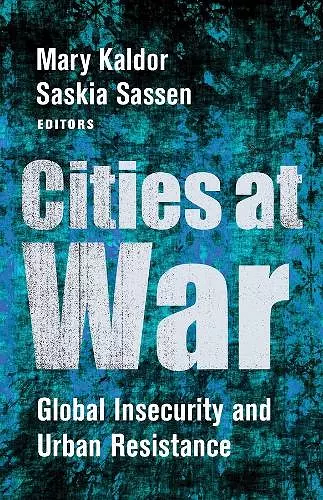Cities at War
Global Insecurity and Urban Resistance
Mary Kaldor editor Saskia Sassen editor
Format:Paperback
Publisher:Columbia University Press
Published:3rd Apr '20
Currently unavailable, and unfortunately no date known when it will be back

Warfare in the twenty-first century goes well beyond conventional armies and nation-states. In a world of diffuse conflicts taking place across sprawling cities, war has become fragmented and uneven to match its settings. Yet the analysis of failed states, civil war, and state building rarely considers the city, rather than the country, as the terrain of battle.
In Cities at War, Mary Kaldor and Saskia Sassen assemble an international team of scholars to examine cities as sites of contemporary warfare and insecurity. Reflecting Kaldor’s expertise on security cultures and Sassen’s perspective on cities and their geographies, they develop new insight into how cities and their residents encounter instability and conflict, as well as the ways in which urban forms provide possibilities for countering violence. Through a series of case studies of cities including Baghdad, Bogotá, Ciudad Juarez, Kabul, and Karachi, the book reveals the unequal distribution of insecurity as well as how urban capabilities might offer resistance and hope. Through analyses of how contemporary forms of identity, inequality, and segregation interact with the built environment, Cities at War explains why and how political violence has become increasingly urbanized. It also points toward the capacity of the city to shape a different kind of urban subjectivity that can serve as a foundation for a more peaceful and equitable future.
Conflict, armed violence, and military interventions are brutal facts of life in cities throughout the world. While some commentators proclaim that cities can take up governance where states fail, or even that mayors might rule the world, reality is more complex. This book is a crucial guide to the reality of urban insecurity—and urban capabilities to cope with insecurity. Its cases come mainly from less rich countries with more or less manifest wars—but the issues considered matter everywhere. -- Craig Calhoun, Arizona State University and the London School of Economics
Sobering but with seams of hope, Cities at War brings together a state-of-the-art collection providing rich analysis of diverse contemporary cities embattled by insecurity, not just as urban theaters of violence or sites of broader conflicts but rather as places of human hankering and ingenious inventiveness and where cities themselves 'talk back.' -- Jo Beall, London School of Economics and Political Science
Urbanization is spreading and conflict in urban areas changes the nature of war. Urbanists, peacekeepers, and military strategists should read this book. There are positive and negative lessons to be learned. -- Rt. Hon. Clare Short
Thinking about war is too often trapped by the idea of a 'battlefield'—literally an open space in which social geographies are suspended for the duration of an armed contest. In this innovative volume, Mary Kaldor and Saskia Sassen fuse the paradigms of 'new war' and 'urban capabilities' to illuminate how urbanization transforms the conduct of war, societal survival during war, and resistance to war. -- Alex de Waal, World Peace Foundation
Cities at War places important questions about how contemporary wars are affecting cities on the intellectual map via a well-chosen collection of case studies that convey the variety of urban experiences of warfare, violence, and avoidance of violence in the twenty-first century. This effective study offers a rich contribution to the field. -- Martin Shaw, author of Genocide and International Relations: Changing Patterns in the Transitions of the Late Modern World
Kaldor and Sassen bring a powerful analysis of the urbanization of warfare as a multi-scalar and transnational process. The book will be of particular interest to researchers working on conflict-ridden cities who intend to understand the working of political violence in all its complexity. * Ethnic & Racial Studies *
this book is a highly valuable resource for scholars in the fields of Urban Studies as well as Security, War and Peace Studies. The richness of the empirical material, the individual chapters that speak to each other so well and the insights into patterns of urbanity provide excellent inputs into discussions of power, resistance, inequality and violence. * Global Policy Journal *
Recommended. * Choice *
ISBN: 9780231185394
Dimensions: unknown
Weight: unknown
264 pages